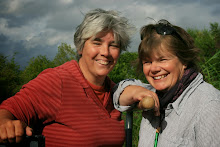Take Bratch Locks for instance. We've walked through the famously popular Bratch Locks lots of times. On foot, we always enjoy a good gongoozling session if we're lucky enough to catch a boat on the move. We spotted two kingfishers in the hedgerow last time we walked this bit of the Staffs & Worcs Canal and spent ages over a picnic, sitting with our legs dangling from the wall outside the old toll office at
 Bratch. This week when we boated through the locks, the journey was a much more serious affair. The primary aim was to avoid death by drowning, and the secondary aim was to complete the course without the unwanted embarrassment of becoming 'The Boaters Who Flooded Bratch Locks' because we didn't follow BW (British Waterways)'s warning signs. For a boater, Bratch is all about the coded blobs of blue and red paint on the paddles. This is BW's bid to help simplify the unusual lock procedure. It's easy once you've read the signs: open the blue-blobbed paddles first and then the red, or is it the red and then the blue? Or both together? (Aaargh... we wish those darn gongoozlers weren’t watching us)
Bratch. This week when we boated through the locks, the journey was a much more serious affair. The primary aim was to avoid death by drowning, and the secondary aim was to complete the course without the unwanted embarrassment of becoming 'The Boaters Who Flooded Bratch Locks' because we didn't follow BW (British Waterways)'s warning signs. For a boater, Bratch is all about the coded blobs of blue and red paint on the paddles. This is BW's bid to help simplify the unusual lock procedure. It's easy once you've read the signs: open the blue-blobbed paddles first and then the red, or is it the red and then the blue? Or both together? (Aaargh... we wish those darn gongoozlers weren’t watching us)Can't believe it's been a whole month since we piled all our belongings into our new sailaway narrowboat at Kingfisher Narrowboats in Trent Lock. There hasn't been much time to build the interior yet. We've been on the move, heading southwards to the Midlands, before the canal freezes in winter. So far we've travelled the River Trent, the Trent & Mersey Canal and the Staffordshire & Worcestershire Canal. As continuous cruisers we have to move regularly to meet BW's regulations – but that doesn't stop us mooring long enough to explore the towpaths and revisit some of our favourite walks.
The only hitch at this time of year is that there aren't enough hours of light to fit in enough walking and boating into a day. Counting down to Dec 21, things will be looking up after the shortest day of the year. We're outdoor people, and hate being trapped indoors. I'm almost (I lie) tempted to join the mad cyclists we hear pedalling past our boat in the dark! They cycle in clumps, and chat together as their lamps flash past at ridiculous times of the night, rain or no rain. Who are they?!
No, we're content to stay boating walkers, or are we walking boaters?









